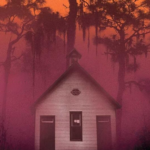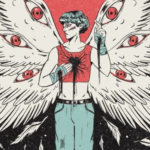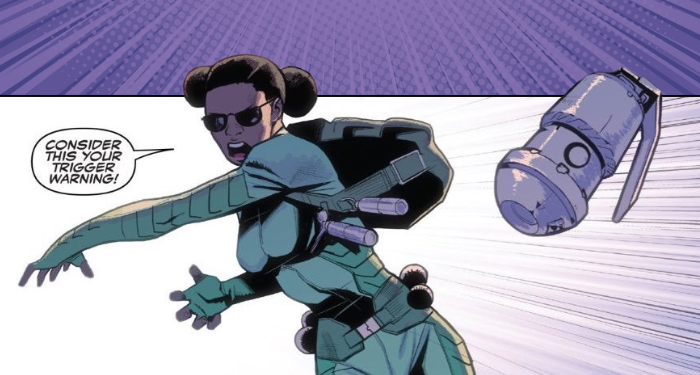
My Least Favorite Comic Book Trope
Superhero comic books are a funny animal. Monthly superhero comics are epic sagas that are part of our modern mythology — but they’re also written and drawn not by superstars, but by people who are equally as likely to be your approachable Twitter mutual as they are to write a comic that gets turned into a billion dollar movie. They’re also published on a fast enough schedule that they can respond to reader feedback within just a few issues.
At its best, this can make the community feel tight-knit and welcoming, bound by a shared love of these silly stories. At its worst, it can make the relationship between readers and creators incredibly toxic. And one of the ways the latter manifests is my very least favorite comic book trope. The closest TV Tropes page I could find was This Loser Is You, but I like to call it The Reader Is The Villain, or The Superboy-Prime Effect.
What am I talking about? Well, Superboy-Prime was originally a hero, an alternate version of Clark Kent from Earth-Prime, a universe meant to be similar to our own. That universe was destroyed during 1985’s Crisis on Infinite Earths, leaving Prime as the only survivor.
He then vanished for nearly 20 years, returning as a villain in the 2005–2006 Infinite Crisis crossover event. Furious that his world had perished while the main DC universe had survived, he attacked the heroes, slaughtering a number of C-listers in cartoonishly graphic ways and killing his main universe counterpart Conner Kent before finally being (temporarily) defeated.
I’m less interested in what Prime does, though, than what he says while he does it. He repeatedly accuses the heroes of acting like villains, of not behaving the way heroes should be, rather than “heroes who are polite and brave and honest,” the way they used to be. “You’re ruining everything!” he shrieks histrionically, childishly, constantly.
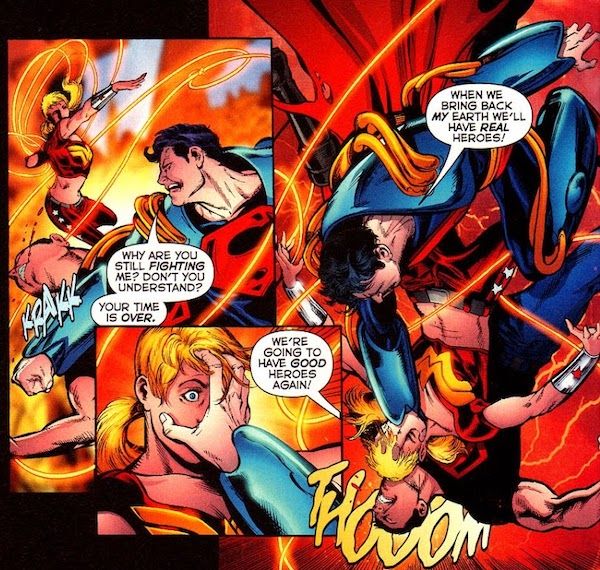
Let’s put this in context. Superboy-Prime became a villain during a particularly bleak, violent era in the medium’s history. In the post-9/11 years, both DC and Marvel were obsessed with stories about moral compromise, heroes faltering, and pyrrhic ends justifying abhorrent, unforgivable means. Identity Crisis and Civil War are the best-known examples of this, but by no means the only ones. In the second half of the 2000s, beloved heroes killed, maimed, tortured, and lobotomized their enemies, and deceived, manipulated, mindwiped, cloned, and sometimes even killed their friends.
A lot of fans didn’t like this. A lot of fans said very loudly that they didn’t like it.
Superboy-Prime was the result.
Superboy-Prime is the entitled fanboy who is furious that comics aren’t the feel-good tales of heroism he remembers from his youth. It’s not a subtle metaphor, but it’s made extra clear in one story where he manages to return to Earth-Prime, where he moves into his parents’ basement and spends his days reading comics and trolling the DC message boards. Get it? Do you get it? Do you???
Look. I’ve been on Twitter. I know how obnoxious some fans can get. But “If you don’t like my work, you’re a mass-murdering hysterical child who is also a big loser” seems like a pretty immature response to negative feedback.
Superboy-Prime is far from the only example of writers depicting their critics as supervillains, and “longtime reader who is sick of grimdark” is far from the only type of critic writers have targeted. We’ve also seen this dismissive response to readers from both sides of the political spectrum:
In 2016, Marvel writer Nick Spencer wrote a controversial plotline in which Captain America (Steve Rogers) was revealed to have been a Hydra agent all along — a plot line that did not sit well with many readers, particularly those on the left. The following year, in Captain America: Sam Wilson, Spencer introduced a new group of Z-list villains called the Bombshells, a parody of leftist activists. When the new Falcon, Joaquin Torres, faces off against a racist pundit, the Bombshells — all young, none of them white men — attack the pundit with murderous intent, forcing Falcon to fight them as well. Throughout, they shout nonsensical “woke” accusations clearly meant to make them sound young and stupid (and female), like “Your very presence is problematic in the extreme! I can’t even!” At one point, a Black woman throws a grenade while yelling “Consider this your trigger warning!” Yes, really.
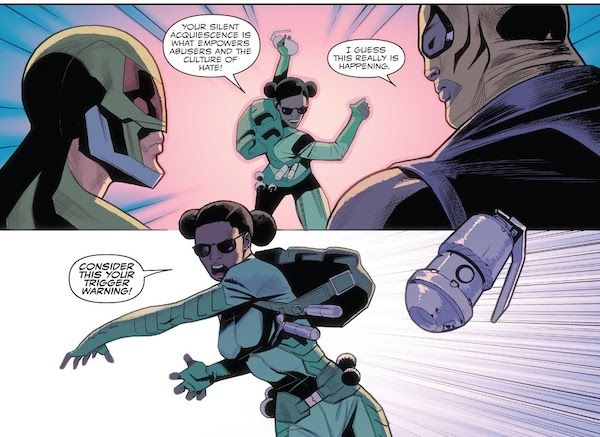
On the other end of the spectrum is this year’s Dark Crisis: Young Justice miniseries by Megan Fitzmartin, in which the three original members of the late ’90s team Young Justice — Superboy (Conner Kent), Robin (Tim Drake), and Impulse (Bart Allen) — are mysteriously zapped to an alternate dimension that turns out to be an idyllic recreation of their lives back in their YJ days. They are increasingly troubled by the misogyny and homophobia of this dream world, which turns out to have been created by Mickey Mxyzptlk, son of the Superman villain Mr. Mxyzptlk and YJ’s self-proclaimed biggest fan. He’s giving them a utopia, he says, because they’ve been “replaced” by “people who don’t have any right to be here” — and he conjures up a splash page’s worth of characters who are all queer or BIPOC or both, most (but not all) of whom debuted in the past couple of decades.
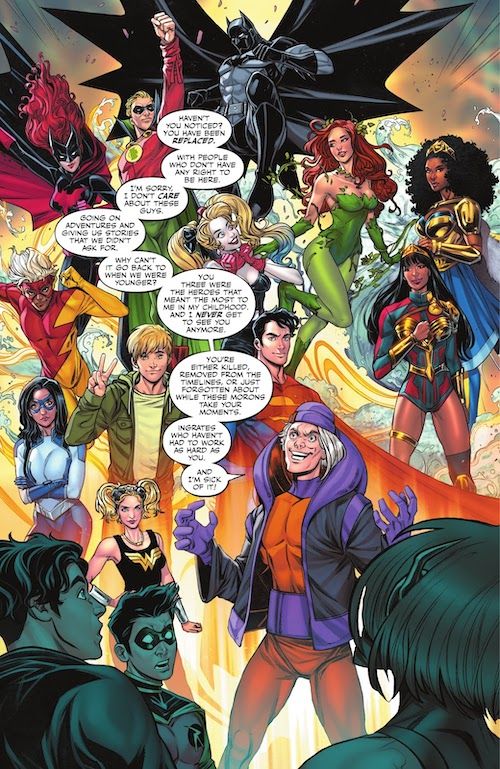
In Spencer’s comic, the villains are woke leftists, who claim to be saving the world but are actually attacking the real, reasonable, sensibly centrist heroes with disproportionate anger and empty buzzwords. In Fitzmartin’s, the villain is the entitled fanboy whose nostalgia is rooted in racism, homophobia, and sexism. From a political perspective, my sympathy is absolutely with Fitzmartin, who, it should be noted, also wrote the comic in which Tim Drake came out as bi and received a vocal and extremely gross backlash from exactly the kind of reader she based Mickey Mxyzptlk on.
But part of the problem with this particular trope is how imprecise it is as a response to criticism. I would never in my life send hate to a comic book creator, but I didn’t like the grimdark edginess of post 9/11 superhero comics, and I said so at the time. That doesn’t mean I appreciate being likened to a murderous crybaby like Superboy-Prime. I loved the original Young Justice comic and missed seeing its cast in comics. That doesn’t mean I don’t like the new characters who have been introduced more recently, or am anything but thrilled about the progress the industry has made in terms of diverse representation. And the Bombshells…yeah, no, I am actually exactly the kind of woke scold Nick Spencer was taking aim at there, but it’s such a childish response to valid criticism that I can’t even work up the energy to be mad about it.
But here’s the thing: even if there’s a reader who doesn’t in any way feel targeted by any of these storylines, what’s the best-case scenario there? They’re reading a comic with the moral of “Hey, you know who sucks? Comic book readers.” That seems like a strange way to address your audience!
Are there fans who behave inappropriately towards creators? Absolutely. Again, I’m on Twitter. I’m aware that every creator’s mentions are a cesspool, and that this is magnified exponentially for marginalized creators. That is unacceptable, and I’ve written before about how publishers need to do more to protect their creators from this sort of harassment.
But I can’t see that the Superboy-Prime Effect is a productive way to address it, either. At its worst, it’s actively harmful, and at its best, it’s still mildly insulting. In a long list of tropes I hate — women in refrigerators, evil clowns, gaslighting your loved ones to protect your secret identity — it’s at the very top. And I hope writers can leave it in the past soon.



